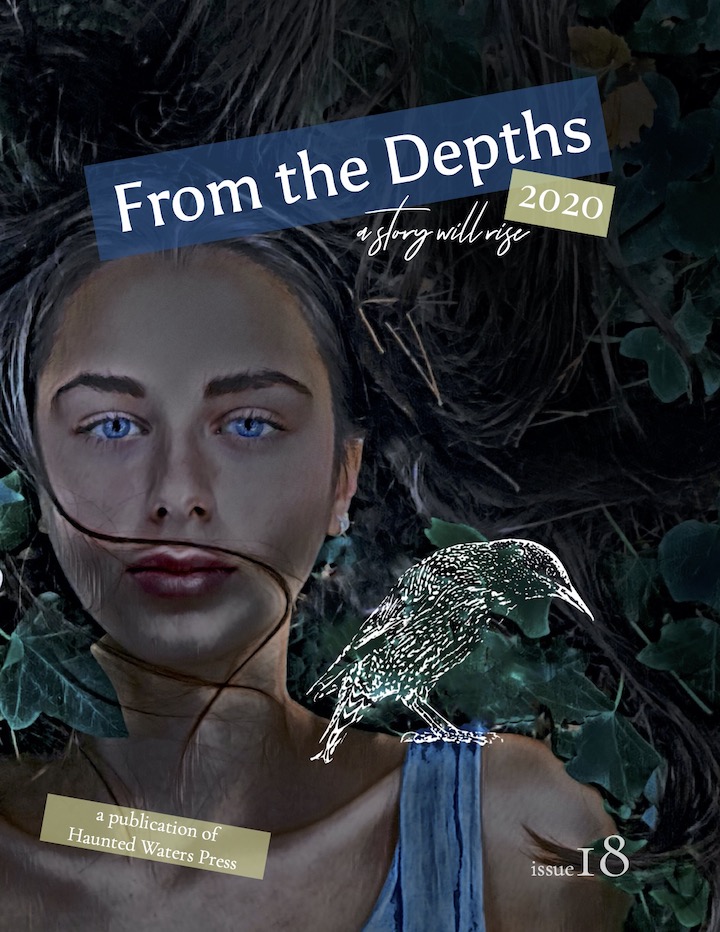Welcome! Today we chat with HWP Contributor Alan Sincic. Alan's work of flash fiction Respect is featured in the 2020 issue of From the Depths. His short story Bacon is showcased in Tin Can Literary Review Volume One. Enjoy!
Certain moments in stories I read when I was young would stun me, not so much in the tale itself—the plot—as in the manner of the telling. The Vertical Ladder by William Sansom—the boy stranded halfway up a water tower and then—bam. That’s it. End of story. Stranded—the boy, the teller, the tale, the reader. A moment for me as memorable as any event in the real world. The strange shift of tone at the end of a book of Paul Bunyan tales, when suddenly the teller abandons the wisecracks to talk about the death of a legend. The loopy logic and twisty syntax in Rootabaga Stories by Carl Sandburg ("Blixie Bimber and the Gold Buckskin Whincher"). How the wind and the rain obscure the broken body of Doodle in The Scarlet Ibis by James Hurst ("I ran as fast as I could, leaving him far behind with a wall of rain dividing us"). When I finally began to write stories of my own, these were the moments that—in a gentle way—troubled me. How do you give a story a distinctive shape, how do you assemble the words in such a way that it’s the wording we remember and not merely the event?
Learn to love the music you make from the noise of your own life. Listen to the songs of others and find a way to harmonize.
—Alan Sincic
What time of day can we find you writing?
If you break into my house in the middle of the night, you might find me at the kitchen table mumbling over an edit, but prime time would be late afternoon through the evening, camped out at my favorite coffee shop.
Let’s talk first drafts. Do you compose on a computer, or are you a pen and paper writer?
Always on paper to begin with and with a slight lean to account for the curvature of the earth. Later, when I’ve got a page or two of graffiti, I type it into the computer, print it out, and then butcher the hard copy with pen in hand. When that becomes unreadable, I print out another clean copy and keep going.
Do you ever give up on an idea? How do you know when a piece just isn’t working?
I generally begin, not with an idea (i.e., a plan) but with a daydream, or the memory of a moment, or a random phrase that—the syntax or the voice or the imagery—intrigues me. Usually, I have no idea where it’s going to lead. My New Car [chapbook at alansincic.com] began with the voice of a guy ordering at the window of a drive-thru: "I will have the Baco-Burger Combo, one for me and one for my new car." From there I was off and running—revisions along the way—with this story of a guy obsessed with his car. Judge for yourself whether it works in the end, but certainly, the writing began with that singular moment. You tug at the random weed. Suddenly you find runners shooting off in every direction (Does he dress for the car? Sleep in it? Wife? Children? Job?), strange and surprising blooms in unexpected places but still, somehow, in some subterranean way, connected. When the connections fail to emerge in that organic way, and you have to puzzle your way through with a schematic in hand, like a mechanic wires the undercarriage of a car, you know the story’s not working.
What advice can you give other writers on writing effective and meaningful stories in under 500 words?
Sometimes a longer story stirs up, here and there, a swirl in the current, a digression or snapshot encounter or lyrical aside—a riff, a rant, a soliloquy—with a distinctive shape of its own. If you’re the kind of writer who tends to generate these little eddies, you might already have—or have the makings of—a piece of flash fiction. But you want to ask yourself: is this (regardless of how proud I am of the writing) a fiction that stands on its own? Do all the parts cohere in a way that suggests they belong to a single whole? Is the mode of expression memorable in and of itself? Remember the truism: you want to fulfill, by the end of the piece, the promise you make at the outset. I can’t promise to justify the ways of God to man in 500 words (sorry Milton), but maybe I can capture what it’s like to face down a pickpocket on a crowded subway.
As a writer, do you find yourself constantly seeking inspiration in the world around you, or do you let the ideas come to you?
Seeking inspiration sounds a bit too grand—I’m just trying to make it through the day without getting food on my clothes—but I’m always on the lookout for moments that nudge me off the mark and into a moment of reverie. It’s out of the reverie the story grows, out of that mixture of memory and fantasy and steerable daydream, steerable not the way a pilot steers a ship but the way a border collie steers a flock—a scatter of separate things shaped by a single will into a functioning whole.
Is there an under-the-radar writer you wish more people knew about?
The late Spencer Holst, teller of tall tales and short, strange fables. Lovely little aperitifs for those who like flash fiction. From Pleasures Of The Imagination (64 Beginnings): “The Floodwaters left a ring on the outside of the bathtub.”
What is the best piece of writing advice you’ve been given?
I think it was Mark Twain who said “The difference between the almost right word and the right word is really a large matter—’tis the difference between the lightning-bug and the lightning.”
If you could tell your younger writing self anything, what would it be?
Learn to love the music you make from the noise of your own life. Listen to the songs of others and find a way to harmonize. Believe in God because—the odds are—he will be your only audience for many years to come.


Lightning Round with

ABOUT THE AUTHOR
A teacher at Valencia College, Alan’s fiction has appeared in New Ohio Review, The Greensboro Review, The Saturday Evening Post, Hunger Mountain, Prime Number, Big Fiction Magazine, Cobalt, Burningword, A-3 Press, and elsewhere. Short stories of his recently won contests sponsored by The Texas Observer, Driftwood Press, The Prism Review, Westchester Review, American Writer’s Review, and The Vincent Brothers Review. He earned his MFA at Western New England University and Columbia and is currently shopping for an agent to represent a recently completed novel.
Share this Post

